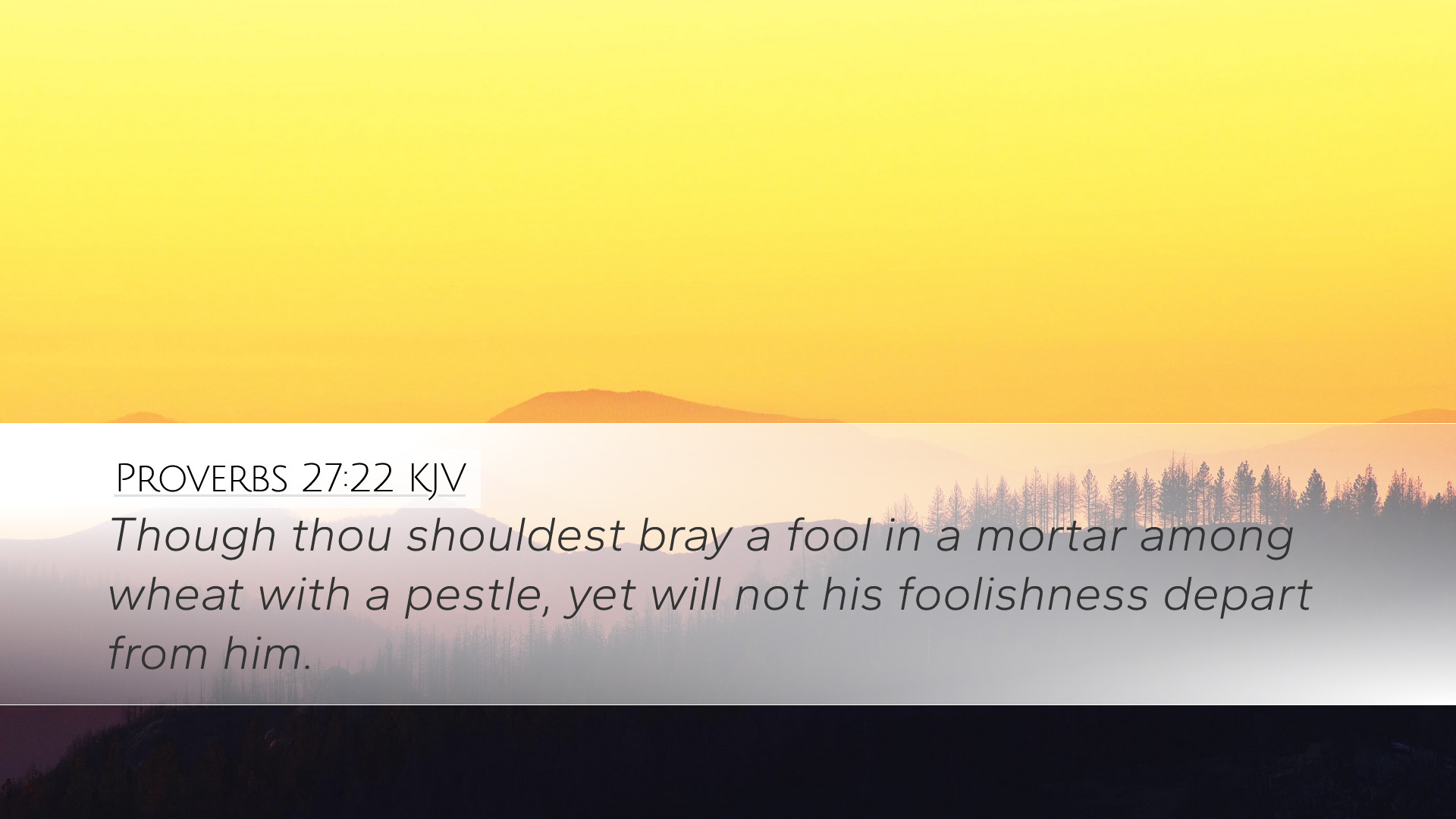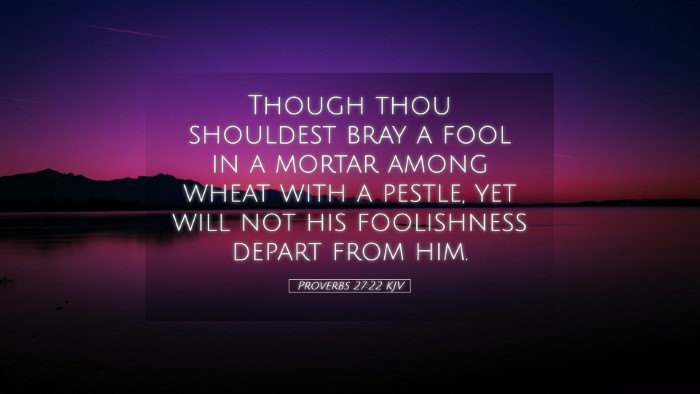Commentary on Proverbs 27:22
Verse: "Though you grind a fool in a mortar, yet will his foolishness not depart from him."
Introduction
This verse from Proverbs succinctly articulates the futility of attempting to change the inherent nature of a fool. It serves as a sobering reminder of the challenges faced when confronting folly, whether in ourselves or in others.
Matthew Henry's Commentary
Matthew Henry emphasizes the stubbornness of a fool's nature. He suggests that despite the most rigorous efforts to correct or discipline foolishness, it remains ingrained in the individual. His commentary reflects the biblical view that character is deeply rooted, and true transformation must come from an internal change prompted by God.
- Resistance to Correction: Henry notes that correction, no matter how forceful, often fails with the foolish. The implication is that mere external pressures cannot affect internal change.
- Spiritual Insight: The connection to spiritual wisdom is clear; individuals must be receptive to divine influence for true change to occur.
Albert Barnes' Commentary
Barnes underscores the idea that the grinding of a fool in a mortar is a metaphor for severe punishment or correction. He argues that such extreme measures highlight the futility of trying to amend a person's character who is unwilling to accept wisdom.
- The Mortar as a Symbol: The mortar represents the trials and tribulations one might face when trying to discipline a fool. Yet, despite these efforts, their folly endures.
- Lessons for Leaders: For pastors and leaders, Barnes suggests that this verse serves as a cautionary tale about how to deal with those entrenched in folly. Wisdom is required to discern when to engage and when to let go.
Adam Clarke's Commentary
Adam Clarke provides a detailed analysis of the social implications of folly. He suggests that foolishness is not just a personal flaw, but also a social disease that can impede communal harmony. Clarke elaborates on the destructive nature of folly, asserting that it can lead to ruin, both individually and communally.
- Folly and Society: Clarke points out that a fool can bring trouble upon themselves and others. This perspective broadens the applicability of the verse beyond personal conduct to the health of societies.
- Need for Discernment: Clarke encourages readers to approach situations involving the foolish with caution and wisdom. It is essential to recognize the limits of human ability to effect change in others.
Theological Reflections
The enduring nature of folly, as expressed in Proverbs 27:22, raises profound theological questions about human nature, sin, and redemption. It points to the necessity of divine intervention for true transformation:
- Human Condition: This verse reflects the doctrine of the fallibility of man, illustrating that without the grace of God, humanity is often entrapped in folly.
- Need for Divine Wisdom: The struggle against folly reminds us of the essential place of wisdom and the need for believers to seek God's guidance in all areas of life.
- Transformation by Grace: The promise of scripture indicates that while humans cannot change themselves, God can bring about new life and renewal.
Practical Applications
For pastors, students, theologians, and Bible scholars, Proverbs 27:22 serves as a springboard for practical applications in ministry and interpersonal relationships:
- Discernment in Ministry: Understand the nature of those you are ministering to; invest effort where there is openness to change.
- Personal Reflection: Each individual should evaluate their own tendencies toward folly and seek God’s wisdom for personal growth and transformation.
- Counseling and Guidance: This passage encourages caution when counseling individuals entrenched in their ways. It requires patience and a strategic approach to lead others toward wisdom.
Conclusion
Proverbs 27:22 offers a powerful reflection on the tenacity of folly in human behavior. The insights drawn from the commentaries of Henry, Barnes, and Clarke illuminate the complexities of dealing with foolishness, both in ourselves and in others. Ultimately, this verse calls believers to rely on God's wisdom and grace, recognizing the need for divine transformation in the quest for wisdom.


